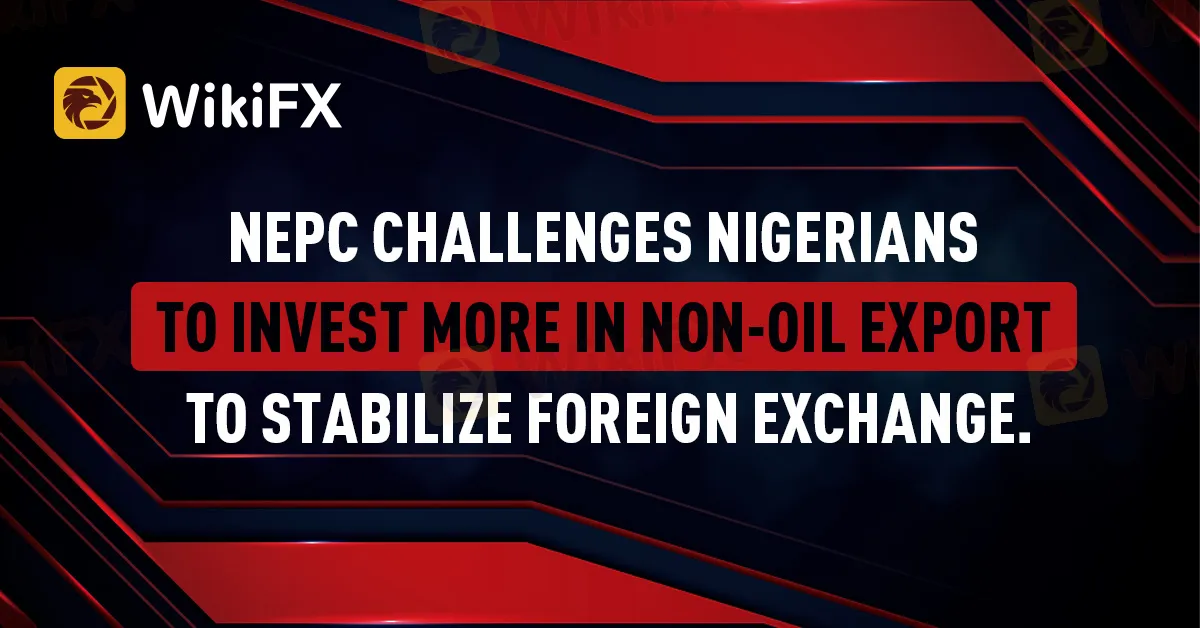简体中文
繁體中文
English
Pусский
日本語
ภาษาไทย
Tiếng Việt
Bahasa Indonesia
Español
हिन्दी
Filippiiniläinen
Français
Deutsch
Português
Türkçe
한국어
العربية
NEPC CHALLENGES NIGERIANS TO INVEST MORE IN NON-OIL EXPORT TO STABILIZE FOREIGN EXCHANGE.
Abstract:According to the Nigerian Export Promotion Council (NEPC), recent changes in the global economy have demonstrated why Nigeria must be committed to exporting its enormous non-oil resources.

According to the Nigerian Export Promotion Council (NEPC), recent changes in the global economy have demonstrated why Nigeria must be committed to exporting its enormous non-oil resources.
According to NAN, the NEPC claimed to have a plan for increasing foreign exchange through non-oil export policies for 22 important items that may produce up to $30 billion in foreign exchange over the course of five years.
Dr. Ezra Yakusak, Executive Director/CEO of the NEPC, said this on Monday at a five-day export promotion capacity-building workshop to boost non-oil exports for Nigeria in order to meet its domestic and international economic demands.
The global economy have made it clear to us that more emphasis should now be laid on the export of our vast resources if we are to survive as a nation, said Mr. Babatunde Falake, Director, International Export Office, NEPC, speaking on behalf of Yakusak.
It is regrettable that Nigeria, although being endowed with riches in manufacturing, solid minerals, the entertainment industry, the creative arts, ICT, and fashion, has continued to rely on crude oil exports as its main source of foreign currency.
In response to the 2016 recession brought on by the collapse in crude oil prices, the council developed its zero-oil plan, he continued, citing how the program focuses on non-oil export policies for 22 major products and has the potential to generate up to $30 billion in foreign exchange over the course of five years.
For the sustainability of the economy, Nigerians have been advised by the Nigerian Export Promotion Council (NEPC) to focus on non-oil export.
While on a visit to the council's regional office in Jos on Monday, Dr. Ezra Yakusak, the executive director of NEPC, delivered the charge in an interview with News Agency of Nigeria (NAN).
Early this year, the Nigerian Export Promotion Council (NEPC) started the export for survival campaign, which is an appeal to all Nigerians.
To heavily invest in non-oil export as a means of subsistence.
If you want Nigeria to survive, you must want it to change. if you want to see this nation's economy flourish.
We must start exporting something outside oil. We can only obtain our foreign currency in that manner.
We can only grow our industries in that way.
“That's the only way we can rebuild Nigeria's economy. For survival, export,” he added.
Yakusak reiterated the significance of value chain development for Plateau's “One State, One Product” policy while also expressing sympathy for the recent potato blight illness that had devastated farms and caused farmers to suffer enormous losses.
He advised them to embrace sound agricultural techniques that, when put into use, will stop the spread of the disease in the future.
You are aware that poor farming practices are to blame for the majority of these occurrences.
We have been using good agricultural practices here at our regional office, which we refer to as GAP.
There are fundamental agricultural methods that we must employ, and when we do, the majority of these situations will be entirely eliminated.
Therefore, he continued, “We go on building capacity for these farmers, and that's what we are doing.”
He urged all state-level players in the potato industry to work together with NEPC to provide them with the support and training they would need.
The “One State, One Product” plan, according to NAN, is a part of the federal government's initiatives to increase export and diversify the economy.
The Irish Potato is the Plateau's “One State, One Product,” according to NAN.

Disclaimer:
The views in this article only represent the author's personal views, and do not constitute investment advice on this platform. This platform does not guarantee the accuracy, completeness and timeliness of the information in the article, and will not be liable for any loss caused by the use of or reliance on the information in the article.
Read more

Bank Negara Malaysia Flags 12 New Companies for Unauthorised Activity
Bank Negara Malaysia (BNM) has updated its Financial Consumer Alert List (FCA List) by adding 12 more entities, reinforcing its efforts to warn the public against unregulated financial schemes. Check if your broker made the list!

TradingView Brings Live Market Charts to Telegram Users with New Mini App
TradingView has launched a mini app on Telegram, making it easier for users to track market trends, check price movements, and share charts.

March Oil Production Declines: How Is the Market Reacting?
Oil production cuts in March are reshaping the market. Traders are closely watching OPEC+ decisions and supply disruptions, which could impact prices and future production strategies.

How to Calculate Leverage and Margin in the Forex Market
Leverage amplifies both potential profits and risks. Understanding how to calculate leverage and margin helps traders manage risks and avoid forced liquidation.
WikiFX Broker
Latest News
The Withdrawal Trap: How Scam Brokers Lure Victims into Paying More
FCA to Investors: Think Twice Before Trusting These Brokers
Trump\s tariffs: How could they affect the UK and your money
Trump gambles it all on global tariffs he\s wanted for decades
TradingView Brings Live Market Charts to Telegram Users with New Mini App
Trump tariffs: How will India navigate a world on the brink of a trade war?
IG Group Acquires Freetrade for £160M to Expand UK Investment Market
U.S. March ISM Manufacturing PMI Released
Should You Beware of Forex Trading Gurus?
Exposed by SC: The Latest Investment Scams Targeting Malaysian Investors
Currency Calculator







